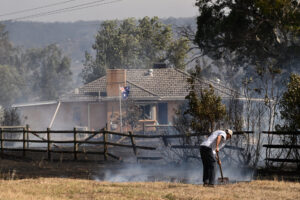Unpacking The Energy Debate
In episode 17 of Follow The Money, we tackle the current energy debate, including the South Australian blackouts, the war on renewables, what Christmas prawns have to do with baseload power and why the way we heat hot water offends our Chief Economist Richard Denniss.
Host: Deputy Director Ebony Bennett // @ebony_bennett
Contributors: Chief Economist Richard Denniss // @RDNS_TAI and Research Director Rod Campbell // @R_o_d_C
Producer: Jennifer Macey // @jennifermacey
Title Track: Jonathan McFeat // pulseandthrum.com
Find us on Twitter // Facebook.
If you want to see some of The Australia Institute’s research on energy, you can read our report on how battery storage solves the ‘problem’ of clean energy, or back in 2013 we predicted the entirely forseeable gas price hikes in Cooking Up a Price Rise or how the Renewable Energy Target puts downwards pressure on prices in Take the Pressure Down.
You can subscribe to The Australia Institute’s podcast series Follow The Money on iTunes. Each episode busts some economic myths, interprets econobabble and helps you sound really smart at your next dinner party.
Between the Lines Newsletter
The biggest stories and the best analysis from the team at the Australia Institute, delivered to your inbox every fortnight.
You might also like
Why a fossil fuel-free COP could put Australia’s bid over the edge
When the medical world hosts a conference on quitting smoking, they don’t invite Phillip Morris, or British American Tobacco along to help “be part of the solution”.
Burning homes and rising premiums: why fossil fuel companies must pay the bill
Another summer, another round of devastation: homes lost, communities evacuated, lives upended.
Dutton’s nuclear push will cost renewable jobs
Dutton’s nuclear push will cost renewable jobs As Australia’s federal election campaign has finally begun, opposition leader Peter Dutton’s proposal to spend hundreds of billions in public money to build seven nuclear power plants across the country has been carefully scrutinized. The technological unfeasibility, staggering cost, and scant detail of the Coalition’s nuclear proposal have





